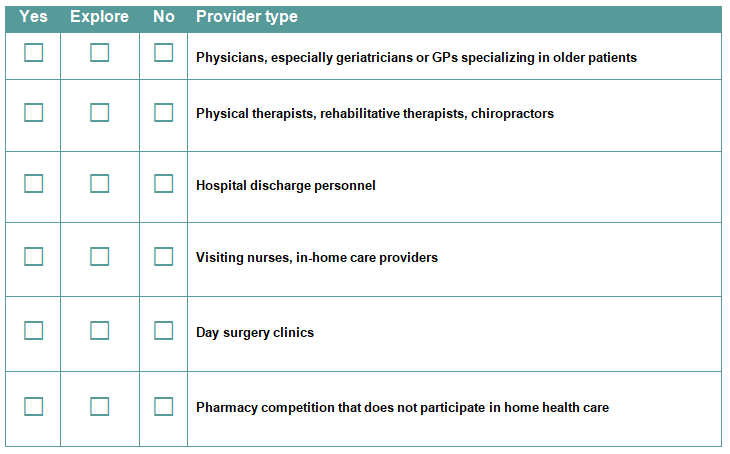By Megan Moyer, senior marketing communications specialist, for the Home Health Care Opportunity blog series
In the fifth post of this blog series, you reviewed your current patients’ prescription and over-the-counter purchase data to gauge the need for additional home health care (HHC) products and services among your patient base. That exercise may have revealed opportunities to build your HHC business based solely on the patients you have right now.
A successful home health care offering can be built “from the ground up” even without an immediate boost from current pharmacy customers, provided there is a need in your community. The worksheets you’ve completed as part of this blog series should have revealed whether there is a demonstrated demand in your area. The presence of other providers of any level of home health care is important evidence of a demand that some are already attempting to satisfy.
It is possible that residents of your area need a source for HHC products but that no retailer or provider has yet stepped in to address this demand. In fact, potential home health patients may be visiting a provider in another city or town simply because their needs are not being met by local businesses. Having a demographic analysis performed for your pharmacy’s area is a critical step in determining whether a significant percentage of local residents fit the profile of the typical HHC patient. Don’t overlook this step – we can help you tailor a demographic analysis that will reveal characteristics about your area’s residents that may surprise you in addition to uncovering profitable business opportunities.
Once a need for home health care products and services has been identified – in whatever way it is identified – you have a number of options to explore to help spread the word about your pharmacy and create valuable partnerships with other local healthcare providers.
Take Action
Fill in the table below with names of providers in your area that fit each provider type listed. This may require some research on your part. Check “Yes,” “Explore,” or “No” to indicate if there are or are not providers with whom you may work collaboratively to serve your mutual patients’ needs.

After you have filled in the preceding table, make a plan to contact each of those providers. The examples below will help you engage on a level that can assist you in building complementary practices. As you establish relationships and discover the dynamics of the healthcare provider community in your area, encourage dialogue, keep lines of communication open, and work faithfully to build relationships that emphasize positive patient outcomes.
Examples of how to build relationships with other healthcare providers
Physicians
Personally visit local physician offices and become well acquainted with the office managers to invite a discussion of their patients’ home health needs. Listen for clues about the types of conditions and concerns they treat most often. This can help you plan your product assortment. More importantly, interacting on a regular basis with local physicians builds a relationship that can encourage referrals to your pharmacy.
Physical Therapists
Visit physical therapy (PT) practices to observe the types of equipment they use with their patients. Common rehabilitative products used in PT (e.g., resistance bands, stability balls, and even lightweight dumbbells) and often recommended for patients to use at home are also sold at retail. Many physical therapists refer patients to local mass discounters or sporting goods stores to purchase these items for home use. Building a referral relationship with physical therapists places the emphasis on collaboration to provide healthcare solutions for patients.
In the next post, which will be the final post of this series, I will offer ideas of how you can promote that you are in the home health care business, and provide you an outline to use to build your plan so you can start building your business.

